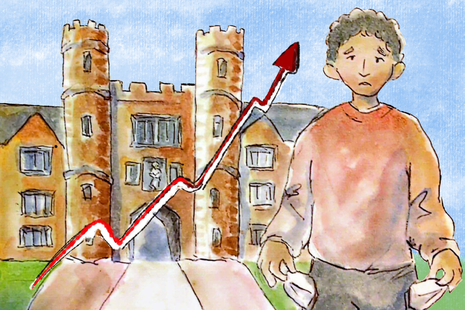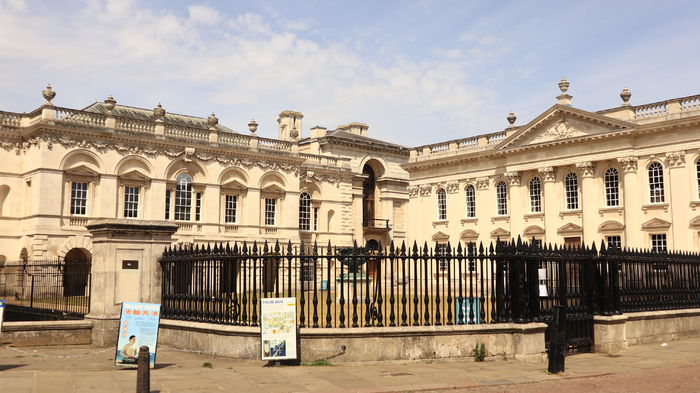When colleges raise rents, everybody loses
Duncan Paterson argues that Cambridge’s wealthiest colleges, by hiking rents far above inflation, are worsening class divides and providing short-term answers to long-term issues

If you stop and think about it for a minute, college accommodation is an absurd system; it effectively exists in a closed property market with little to no competition, all based around who owned what buildings in this tiny city a few centuries ago, and as a consequence, it is often difficult to hold colleges to account for rent and overall cost of living. In general, it seems, rent increases are being kept below inflation, but for the three guilty parties – St John’s, Corpus Christi, and Trinity – it will take a lot of convincing to persuade people that raising rents so far above inflation, and more significantly so far above other colleges, was the only solution to the universal issue of increasing energy and labour costs. I don’t think they will have much success…
Now, any self-respecting HSPS student will tell you that class is not simply about money, but includes stuff like “cultural capital” and “education level”, and in our modern age it is becoming increasingly complicated to demarcate people along such partisan social lines. Ultimately, however, wealth becomes the vehicle through which people access those things, including institutions like this very university, and it is not exactly ground-breaking comment journalism to say that there is already a class divide at Cambridge which will be exacerbated by these rent increases. While colleges do have systems in place to try and neutralise the disproportionate financial impact that attending Cambridge has on individuals like bursaries and other methods of financial support, the current formulae are simply not good enough. As always, low-income and economically vulnerable students will be the first impacted by the increases, and the most impacted.
“Now, any self-respecting HSPS student will tell you that class is not simply about money”
Now, shifting focus from the present to the future, how will this affect the University of Cambridge in the next few years? Well, this isn’t exactly a sudden paradigm shift; this will not go down in history as the event, where people ask you, like the start of the Covid-19 pandemic in 2020, where you were when St John’s raised their rents by 17.5% in 2024. No, this is simply the latest small event in a long series of small events which constitute the creep of the increased cost of living felt all over the country for the last five years or so, and which is responsible for the gradual decline of universities across the UK.
If you want to be really cynical about it, the University will always have people willing to pay stupid amounts of money to attend exactly because of its prestige, its mystique; the devil works hard, but the University of Cambridge’s reputation works harder, cultivated and bolstered by a cultural significance stretching back hundreds of years. However, it is the government who should be worried about elite British universities becoming less financially accessible. Theoretically, one of the main selling points for getting people into university is that it is a long-term investment for the British economy; once students become graduates, they “make money” for the government first and foremost by contributing to the national economy through higher earnings, increasing the tax base and increasing productivity, alongside repaying their student loans as a return-on-investment. However, barriers to entry like rent increases and the general cost of living mean low-income households are less able to afford to send students to Cambridge or higher education in general, and hence, alongside the young person losing out in the short term, when this is replicated thousands of times the country loses out as well.
“Both parties see themselves between a rock and a hard place”
Inevitably, topics like this result in the usual response from the Camfess warriors saying something along the lines of “if you feel so irate about accessibility here, either leave or do something about it”. In a way, they are right; as president of my college’s JCR, I have seen how one of the most common issues our committee brings to college, like most other committees, is the increasing cost of living and how students need answers to the question of how they can be supported. Often, the answer comes from down to the committee from on high, and is thus passed on; the college is doing the best they can, but they cannot afford to go any lower. From both students and college I have heard accusations of entitlement being levelled at the other, often born out of tensions boiling over rather than having any actual weight behind them, and I can’t imagine this animosity is unique to my college. Will these rent increases result in student strikes like those in King’s and Sidney Sussex in 2023? I don’t know. Will this worsen tensions between student bodies and their colleges? Absolutely. Both parties see themselves between a rock and a hard place: colleges between the requests for cheaper rent and the economic demands of keeping the ship afloat, and students between a cost of living crisis and what appears to be a merciless college landlord.
While I can’t present a solution, students should not be put in the position where they are “afraid of doing anything to anger College,” and colleges must recognise the increasing burden being put on students by wider national issues over which they have little to no control. To keep the metaphor going, to students, it will feel like colleges are standing on their shoulders to keep their own heads above water, when in reality everyone’s on the same sinking ship that is the UK economy. Until land is sighted, the economy bounces back, and the pressure is taken off the economically vulnerable, rent increases are simply just going to be the short-term fix, a coping mechanism which will replace any actual long-term solution to the collegiate micro-economy.
 News / Colleges charge different rents for the same Castle Street accommodation2 March 2026
News / Colleges charge different rents for the same Castle Street accommodation2 March 2026 News / News in Brief: waterworks, wine woes, and workplace wins 1 March 2026
News / News in Brief: waterworks, wine woes, and workplace wins 1 March 2026 News / Climate activists protest for ‘ethical careers policy’1 March 2026
News / Climate activists protest for ‘ethical careers policy’1 March 2026 News / Angela Merkel among Cambridge honorary degree nominees27 February 2026
News / Angela Merkel among Cambridge honorary degree nominees27 February 2026 News / Private school teacher who lied about Cambridge degree barred from teaching27 February 2026
News / Private school teacher who lied about Cambridge degree barred from teaching27 February 2026









